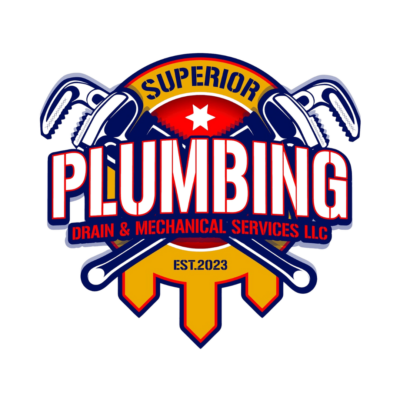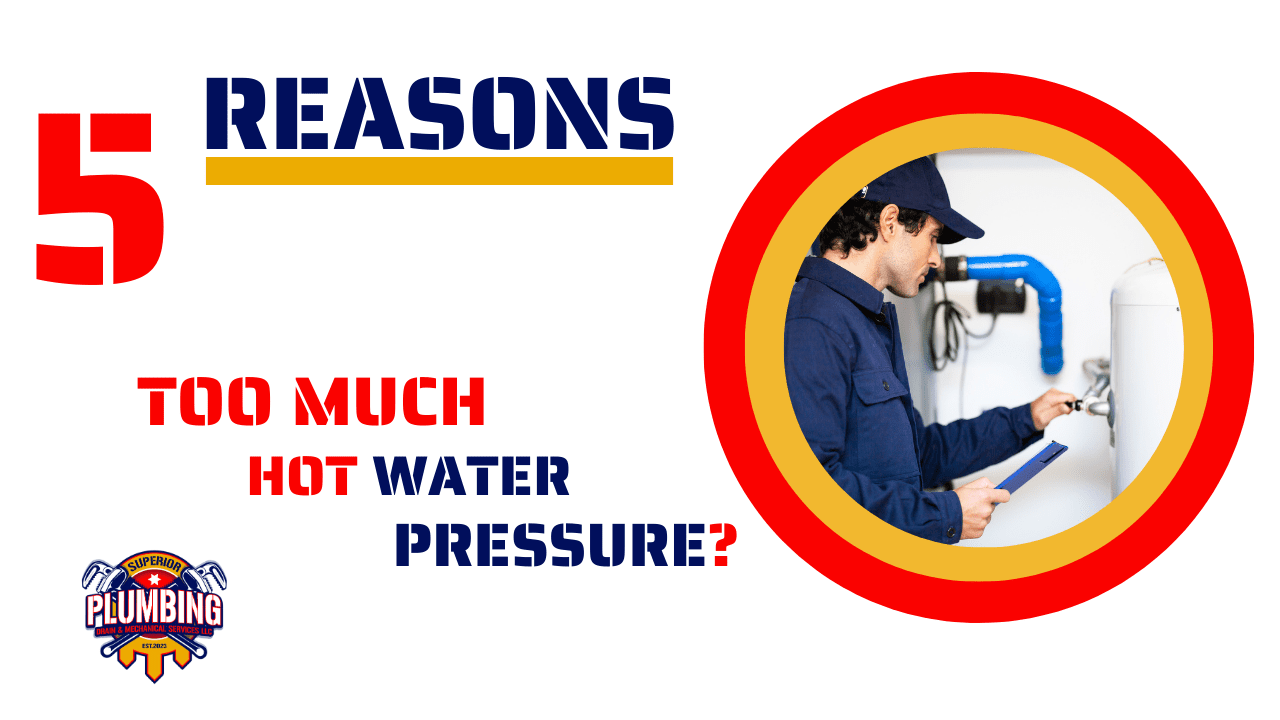Have you noticed your shower turning into a forceful mini-carwash? Or, maybe you’ve heard strange knocking sounds coming from your hot water heater.
These could be signs of excessive water pressure, a problem that can damage your plumbing system and lead to costly repairs.
Here at Superior Plumbing, we believe informed homeowners are empowered homeowners. That’s why we’re diving deep into the causes of high water pressure in hot water heaters, so you can keep your home’s hot water running smoothly and safely.
How a Hot Water Heater Works
A hot water heater uses electricity or gas to heat up water in a tank. The hot water rises to the top for you to use, and cold water enters the bottom to be heated again.
Common Causes of Too Much Pressure
Excessive pressure in your hot water heater can be caused by a variety of factors lurking beneath the surface.
Internal components like heating elements or the pressure relief valve can malfunction. The culprit could also lie with your water supply or even a build-up of sediment within the tank itself.
Don’t worry, we’ll be dissecting these common causes – including corrosion, thermal expansion, faulty temperature settings, and even broken heating elements – in detail throughout this blog.
By understanding the reason behind the high pressure, you can take proactive steps to address the issue and keep your hot water heater functioning safely and efficiently.
- Corrosion
- Excessive Pressure Buildup
- Temperature Settings
- Broken Heating Elements
- Incorrect Tank
Signs of Excess Pressure
Not sure if your hot water heater is experiencing high water pressure? Keep an ear out for unusual noises, like knocking or banging, coming from the tank. Sounds like this can indicate internal pressure fluctuations.
Additionally, visible signs of wear and tear on the tank itself, like leaks or bulging, could be a red flag. Cloudy or discolored hot water could be a sign of trouble also. Elevated pressures can force minerals and sediment from the tank into your water supply.
If you see any of these signs, you may need professional help. Superior Plumbing offers thorough hot water heater inspections. We’ll diagnose the problem and make sure your system is functioning safely and efficiently. Don’t wait for a major issue – contact us today for peace of mind and a healthy hot water heater!
- Odd Sounds
- Leaks or Bulges in the tank
- Cloudy or discolored water
Common Causes in Detail
Corrosion
Corrosion is a process where metal breaks down from exposure to water and minerals. It can be a sneaky culprit behind high pressure in your hot water heater. Over time, an older tank can become increasingly susceptible to corrosion. This can lead to several issues:
- Cracked Tank: Uneven heating caused by corrosion can weaken the tank, potentially leading to cracks that disrupt pressure regulation.
- Anode Rod Failure: The anode rod attracts corrosion, protecting the tank itself. However, a deteriorated anode rod can’t do its job effectively, allowing corrosion to eat away at the tank and affect pressure.
- Mineral Buildup and Sediment: Corrosion can accelerate the buildup of mineral deposits and sediment within the tank. This accumulation can restrict water flow and contribute to pressure spikes.
Excessive Pressure Buildup
The key to a happy hot water heater is maintaining the proper water pressure. Ideally, the pressure gauge should read between 40 and 60 psi. However, excessive pressure buildup can throw this delicate balance off track. Two main culprits are internal and external to your system:
- Faulty Pressure Relief Valve (PRV): This safety valve is located near the cold inlet pipe and is designed to release excess pressure if it builds up beyond safe limits. A malfunctioning PRV can become stuck closed, preventing pressure release and causing a spike.
- City’s Water Pressure: In some cases, the water pressure coming from your city’s main line might be too high. This can overwhelm your hot water heater’s internal pressure regulation system.
- Temperature and Pressure (T&P) valve: This is another safety feature. It might not be able to handle the high incoming pressure.
Temperature Settings
Just like a pot of water on the stove, the hotter your hot water heater is set, the more the water expands. This expansion, known as thermal expansion, can lead to pressure spikes within the closed tank of your hot water heater.
To avoid this stress on the system, it’s important to maintain the recommended temperature setting, which is typically no higher than 120 degrees Fahrenheit. By following this guideline, you can ensure both comfortable hot water and safe operation of your hot water heater.
Broken Heating Elements
Broken heating elements can also contribute to pressure woes in your hot water heater. In both gas and electric models, malfunctioning heating elements can disrupt the normal heating cycle.
For gas models, this might lead to incomplete combustion, causing the water temperature to fluctuate and potentially leading to thermal expansion and pressure spikes.
In electric models, a broken element might not regulate temperature properly, causing the water to overheat and experience the same pressure-increasing expansion.
If you suspect a broken heating element, it’s crucial to address the issue promptly to avoid further problems with your hot water heater’s pressure and overall functionality.
Incorrect Hot Water Tank
While uncommon, you could have the wrong type of tank for your plumbing system. It can also influence pressure levels in your hot water heater. Most modern units utilize glass-lined steel tanks for their durability and resistance to corrosion.
However, in older models, you might encounter a traditional galvanized steel tank. These tanks are more susceptible to corrosion over time, which can weaken the tank walls and potentially lead to pressure irregularities.
If you have a very old hot water heater and are experiencing pressure issues, consider the possibility that the tank material itself might be contributing to the problem.
The Dangers of High Pressure
Ignoring high pressure in your hot water heater isn’t just an annoyance – it can lead to serious consequences. Here’s why you shouldn’t delay addressing the issue:
- Increased Costs: Excessive pressure can force unheated water through the bypass valve, causing your heater to work harder and driving up your energy bills. Additionally, a leaky pressure relief valve can lead to wasted water and higher water bills.
- Component Failure: The relentless strain of high pressure can damage the hot water tank itself, potentially leading to leaks or even a catastrophic rupture. This can cause significant water damage and require expensive repairs or replacement.
- Plumbing Problems: The pressure spikes can wreak havoc on your pipes, causing leaks, bursts, and potential flooding. This can damage your home’s infrastructure and lead to costly repairs.
- Safety Hazards: Extremely hot water due to high pressure can cause scalding injuries, especially for children who are more vulnerable. In the rarest instances, a weakened tank under extreme pressure could even explode, posing a serious safety risk.
How to Reduce Pressure in Hot Water Tank?
High pressure can be a real headache. The simplest cure could be calling a professional.
Superior Plumbing of Tulsa’s licensed plumbers are here to help. Our experts have the knowledge and tools to diagnose the root cause of the pressure issue and implement the most effective solution.
Whether it’s a faulty pressure relief valve or a malfunctioning internal component, Superior Plumbing will get your hot water heater back in tip-top shape, ensuring your safety and efficient hot water flow.
However, if you’re comfortable with some DIY troubleshooting, here are a few practical tips to try and reduce pressure in your hot water heater:
- Check the Pressure Gauge: First things first, locate the pressure gauge on your hot water heater. It should ideally read between 40 and 60 psi. If it’s higher, proceed with the following steps.
- Drain Some Water: Turn off the water supply valve to the hot water heater and attach a hose to the drain valve located at the bottom of the tank. Open the drain valve carefully to release a small amount of water (be sure to have a bucket ready to collect the drainage). Monitor the pressure gauge as you drain and stop when the pressure falls within the recommended range.
- Inspect the Relief Valve: Visually inspect the pressure relief valve for any signs of wear or leakage. If you notice anything abnormal, it’s best to call a plumber for a replacement.
Remember, these are just a few basic tips.
If you’re unsure about any step or the pressure doesn’t normalize, always err on the side of caution. Contact a qualified plumber like Superior Plumbing of Tulsa. We are always happy to help!
In Summary
Taming a high-pressure hot water heater doesn’t have to be a mystery. By understanding the common culprits and following these tips, you can take control of the situation.
Remember, prevention is always better than a repair. Regular maintenance, which can be performed by a licensed plumber like Superior Plumbing of Tulsa, can identify potential pressure issues before they arise.
Additionally, consider installing an expansion tank, which acts as a pressure buffer and helps absorb pressure fluctuations within the system.
With a little knowledge and proactive maintenance, you can keep your hot water heater functioning safely and efficiently for years to come. So, enjoy that relaxing hot shower – peace of mind is included!


Leave a Reply